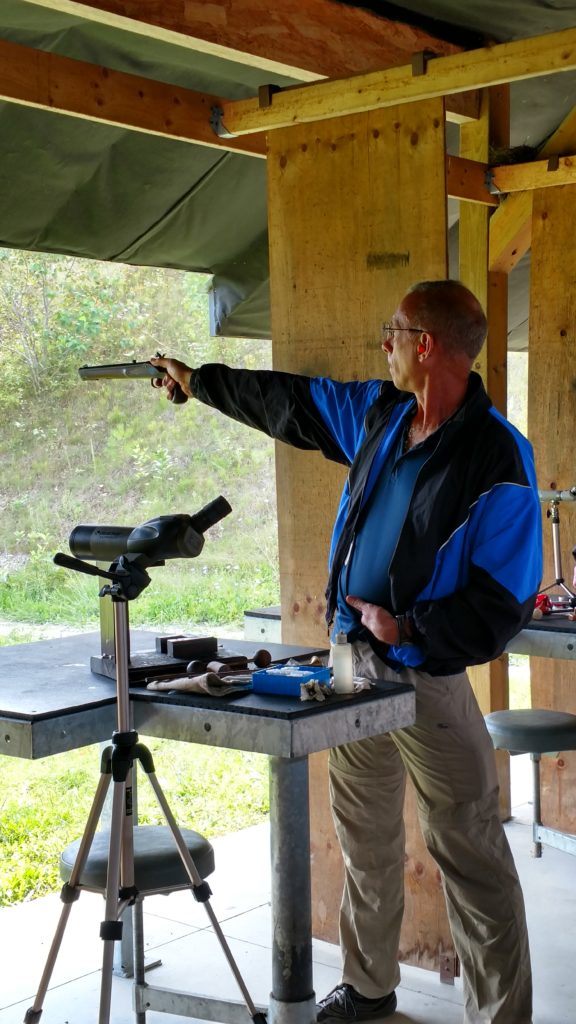Curt Brandt, An interview with the newest USIMLT Board Member
June 2021

Curt’s appointment to the Board of the USIMLT was occasioned by the vacancy created by the passing of long-time member Allen Godshalk. While Curt is a relatively new member of the short-range team his qualifications, experience, judgement and manner immediately brought him to the attention of fellow board members as a candidate for future Board membership. John Ciccone recently interviewed him for this introductory article.
JC: As a new Board member, what are your ideas for the team?
CB: Coming in as new and an outsider, I have general, broad goals. I want to use my strengths, abilities and talents to assist the Board in developing the most competitive team across all disciplines to include long-range, short-range and juniors as well.
JC: Tell me about your background, I understand you went to the West Point Military Academy?
CB: I’ve always known what I wanted to do. I always wanted to be in the military. My grandfather, father, and some of my uncles served in the military and that had a big influence on me. I went to West Point, and spent 30 years in the Army. The first eight years were in the infantry including pathfinder, ranger and light infantry units.
The last 22 years I was a Special Forces officer. My operational assignments were in the 7th Special Forces Group (SFG) and the 5th SFG. Most of my time in 7th SFG was spent on counter-drug missions in South and Central America and in 5th SFG the missions I participated in were training and exercises with the friendly nations around Iraq during the post-DESERT STORM and pre-IRAQI FREEDOM era.
As a senior Lieutenant Colonel and Colonel, I finished my career with four staff tours working in either operations or requirements and resources. Two of the tours were with SOCOM [Special Operations Command is the unified combatant command charged with overseeing the various special operations component commands of the Army, Marine Corps, Navy, and Air Force of the United States Armed Forces], one with SOCCENT [Special Operations Command – Central, the sub-unified command responsible for special operations in Southwest Asia] and a one-year tour with MNF-I [Multi-National Force Iraq, the Combined Joint Headquarters responsible for coalition operations during IRAQI FREEDOM].
After retirement I spent several years as a defense contractor managing staff augmentation contracts for SOCOM. As of 2017, I am completely retired.
JC: I imagine you had a good deal of training in terms of your own marksmanship as well as training others.
CB: Yes, as a Special Forces soldiers we would go to other countries and train their military forces in basic marksmanship and then do some advanced training on our own, close quarters combat, things like that.
JC: It strikes me, that with that kind of background, you would have gone into F Class competition or something using a modern gun. What is it that got you into black powder of all things?
CB: I occasionally shoot NRA precision pistol, IDPA, USPCA and Glock matches. But, when I retired from the Army, I had some free time to pursue neglected interests. One of those is firearms and the other is American History, specifically the Colonial and Revolutionary War periods. I found a black powder shooting club near where I live. I showed-up at one of their matches and a fellow was gracious enough to let me shoot a flintlock rifle. I was hooked! From there I just started expanding my participation with club matches, state championships, NMLRA territorials, then the U.S. International Muzzle Loading Team, and the guys on the Team roped me into N-SSA.
JC: What disciplines do you shoot, particularly with the USIMLT?
CB: That’s also been expanding. I think with the last Zone Championships I shot ten events and that was everything except flintlock smooth bore musket and the matchlock events. I’ve since bought a Brown Bess, so that will be 11 disciplines, everything except matchlock.
JC: What’s your training routine?
CB: Especially before a big match, I’ll train 2 to 4 times per week, with as many as 80 shots in a session, depending on what kind of discipline I’m practicing…fewer with the flintlock rifle and more with the revolver. Most of the other times, I average one training session a week 2 club matches a month. It’s also important to stay fit, so I do quite a bit of running and calisthenics to help with that.
JC: You mentioned earlier that you have an interest in the Colonial and Revolutionary periods of American history. Are there any particular people or events in particular?
CB: My favorite topics to read about are the Colonial Ranger units, the longhunters during the period between the French and Indian War and Revolution. My favorite unit in the Revolutionary War is Daniel Morgan’s Riflemen. I’m also fascinated by Daniel Boone.
JC: (Laughing) I imagine they would be! Obviously you read a lot about Morgan and Boone, do you have favorite books you can recommend?
CB: As for Daniel Boone, I suggest Daniel Boone: The Life and Legend of an American Pioneer,by John Mack Faragher. Both Boone and Simon Kenton were the perfect blend of frontier skills and character. Boone had a way of getting along with everybody, including the Indians. That’s why I respect Boone the most.